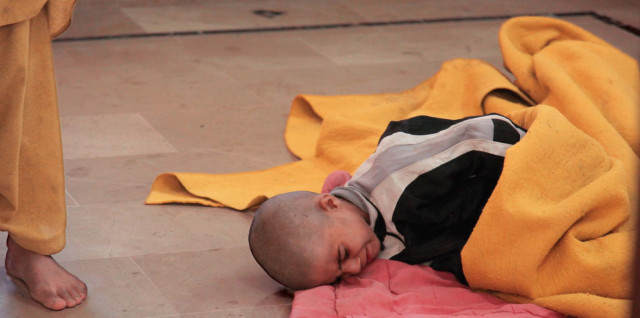Karachi seminary torture: Released from shackles, rejected by families
Unmoved by tales of torture, parents insist the seminary be restored.

Karachi seminary torture: Released from shackles, rejected by families
Around 34 adults and 14 children, rescued from a seminary-cum-rehabilitation centre by the police on Monday night, waited anxiously to go home on Tuesday. But outside the Gulshan-e-Maymar police station, their families refused to take them back.
“We have not come here to take them with us. We want the seminary to be restored.”
One man, Muhammad Sheikh, said he had provided chains to the authorities to beat his brothers. Another man, Ameer Hamza, said the seminary was ‘jannat’ (heaven), and that severe punishments are necessary for drug addicts and thieves.
A mother, whose son was among those recovered, shouted: “I will pay Rs10,000 to the police to take responsibility of my child.” The woman said she has been paying the seminary a monthly fee of Rs8,000 by taking loans from relatives.
Life in the basement
Were the families unmoved by the treatment meted out to their ‘loved ones’?
One of those recovered, a man named Hidayatullah, hailing from Gulshan-e-Iqbal, related the victims’ daily ordeal.
“We woke up every day at 4 am to whipping by the clerics,” said the man.
A drug addict, he was left at the seminary seven months ago by his family.
Breakfast was two paapar (poppadom), followed by qaida (primer) lessons. If you made mistakes, you were whipped with an industrial belt. Lunch was a plate of watery daal and burnt rotis.
Qaida lessons continued in the afternoon followed by prayer breaks and religious instructions. The day ended with watery daal served as dinner at eleven.
“Nights were not peaceful either,” Hidayatullah said. Cramped in a small room, the men were chained to pillars, and could only sleep in a straight position.
The men were not allowed to use the bathrooms at night either. “It’s embarrassing to tell but we were given a water bottle to pee in. If we urinated in bed, we were lashed,” said Babar, a teenager. Water to drink, from bathroom taps, was sometimes given in the same bottles, he added. Bathing was only allowed on Thursdays since families would visit them on Friday. The five-minute bath was the only time they were freed of chains.
The horror doesn’t end
How did the torture continue for so long?
The victims say they were never able to tell their families. “Mufti Dawood and his men had guns. They threatened to beat us if we told anyone.”
One of the most-affected victims, a bald man named Wali, sat in the middle, staring at thin air. He was whipped 150 times, in two days. “He has lost his senses,” the men said.
The children were not spared from the beatings either.
Four-year-old Asadullah, said to be a nephew of Mufti Dawood, was also beaten when he was unable to procure food for the seminary, from the neighbours.
Not all men were sent voluntarily by their families. A woman from Lyari said her son, Muhammad Arif, went missing after he left to attend the Tableeghi Ijtima at Raiwind in 2008.
“My relatives saw him on television,” she said. “I am happy that he is alive, but sad that he has suffered so much.”
Despite the torture, the children say they would continue to study at a seminary, not this one though.
One of them piped in: “I would become a qari (religious teacher) and go to Afghanistan for jihad.”
Investigators, however, say they did not find any links to terrorist activity.
“There was no terrorism training going on there,” said DSP Mukhtiar Khaskheli.
“What was happening there (rehabilitation) was right; just the method was wrong which is why we had to take action,” he added.
When not to follow your ‘teacher’
One of the culprits, Qari Muhammad Usman, sat blindfolded in the lockup.
He said he had joined the seminary two months ago and insisted they were not doing any criminal or terrorist activity. While the inmates slept on floors, Usman had his own room and bed.
The administration charged between Rs3,000 and Rs15,000 as fee – for treatment, food and religious studies, he said. The fee was waived off for those who could not afford to pay.
“I might have beaten them sometimes,” he said, very reluctantly accepting that the people should not have been treated so cruelly. “But Mufti Dawood was a mufti (scholar) and we did what he said,” he said in his defense.
‘Not a seminary’
Wafaqul Madaris alArabia, an umbrella organisation controlling Deobandi seminaries, said in a statement that the compound from where chained inmates were recovered was a rehabilitation centre for drug addicts, not an institute for religious education.
(Read: Need for madrassa reform)
(With additional reporting by our correspondent in ISLAMABAD)
Published in The Express Tribune, December 14th, 2011.



















COMMENTS
Comments are moderated and generally will be posted if they are on-topic and not abusive.
For more information, please see our Comments FAQ